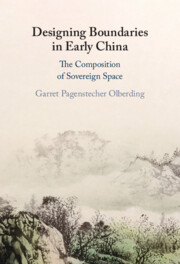Book contents
- Designing Boundaries in Early China
- Designing Boundaries in Early China
- Copyright page
- Dedication
- Contents
- Maps
- Acknowledgments
- Chronology
- Preamble
- 1 The Basis of Ancient Borders
- 2 The Visual Modeling of Space in Text and Map
- 3 Movement and Geography
- 4 The Perception of the “State”: The Internal Definition of Sovereign Space
- 5 The Perception of the “Enemy”: The External Definition of Sovereign Space
- 6 Transgressions: Rupturing the Boundaries Between Sovereignties
- Conclusion
- Bibliography
- Index
6 - Transgressions: Rupturing the Boundaries Between Sovereignties
Published online by Cambridge University Press: 19 November 2021
- Designing Boundaries in Early China
- Designing Boundaries in Early China
- Copyright page
- Dedication
- Contents
- Maps
- Acknowledgments
- Chronology
- Preamble
- 1 The Basis of Ancient Borders
- 2 The Visual Modeling of Space in Text and Map
- 3 Movement and Geography
- 4 The Perception of the “State”: The Internal Definition of Sovereign Space
- 5 The Perception of the “Enemy”: The External Definition of Sovereign Space
- 6 Transgressions: Rupturing the Boundaries Between Sovereignties
- Conclusion
- Bibliography
- Index
Summary
Diplomacy is an essentially transgressive activity, inhering the potential to subvert state interests in its very rhetorical phrasing of affairs. Ritual codes, or their intentional absence, played a vital role in these exchanges. Like the transgressions of spirit invocators, state ambassadorial transgressions across boundaries were religious, with secular administrative effects. This might in part explain the widespread regulations pertaining to diplomatic activities. Indeed, the very movement of the ambassador beyond the sanctified state space, without its protections, was perilous. Nonstate territory was equated with the criminal, the socially dead, the monstrous. Overcoming the “bestial” peoples of such “criminal,” “monstrous” external realms was perceived as a triumph of civilization. Received guests (bin) from these areas were naturally affected by entailed condescensions. Rhetorical jostlings about ritual obligations between rulers, prominent in the exchange between Emperor Wen of Han and the Xiongnu shanyu, were intentionally meant to have an effect on the soft sovereign power of the interlocutor.
- Type
- Chapter
- Information
- Designing Boundaries in Early China , pp. 156 - 178Publisher: Cambridge University PressPrint publication year: 2021

